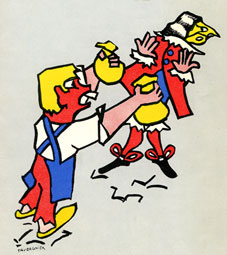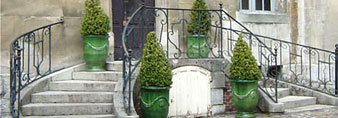DEATH AND THE DYING MAN (VIII,1)
Death comes not on the wise man unawares ;
He daily for the messenger prepares,
Decided for the passage, waits the hour
Death's hour-alas ! all time is in his power.
Divide it into days, hours, moments- none
Escape the fatal dues : - all bend before his throne,
And the first instant that the sons of kings
Open their eyelids on the light,
He oft the order to the palace brings,
That seals them up in endless night.
Plead grandeur with him or renown,
Beauty, youth, virtue plead in vain :
Unblushing Death still hews them down.
One day the world around shall swell his train.
Nothing to mortals less unknown,
And, since the truth must be declared,
Nothing for which they're less prepared.
A dying man, who had attained
A hundred years, counting on future still,
To Death complained,
That he too suddenly called him away,
Ere he had made his will,
And given him no notice of the day.
" What ! is it fair to strike an unseen blow ?
Postpone, O Death, a little, pray !
My wife desires that I for her should stay.
Let me my grandson settle ere I go,
And let me to my house add still a wing :
Oh ! why are you so pressing, cruel king ?"
"Old man," cried Death, " be not so blind and bold,
To say that I come on thee unawares
A hundred rolling suns for thee I've told :
Where find in Paris two so sunk in years ?
Or where find ten all over France so old ?
I should, you say, the summons have delayed,
Till you the summons were prepared to meet,
Your grandson settled, and your house complete,
And till your testament was made.
Old man, could not the cause enlighten thee ?
When motion left thy power of walking dead,
When all before thee seemed to flee,
Nor life, nor death, nor memory in thy head,
And hearing, taste, and sight together sped :
The sun but yielding thee a useless light,
With all thy senses thus extinguished quite ?
Before thee I have often laid
The sick, the dying, and the dead,
Thy fellows all, who waiting warned thee still ;
Then come, old man, and cease thy prayers,
The commonwealth but little cares
About thee or thy will."
Death argued right. I wish that at such age,
As from a banquet, men might quit the stage,
Thanking the boat, their packets made and gone ;
For who that journey can a breath postpone ?
Old murmuring man, behold these youths who die ;
Behold them march, or rather, see them fly
To certain death, a glorions death, 'tis true,
Yet oft, alas ! too horrible to view ;
But I in vain their great example set,
Death's nearest neighbours die with most regret. |
|
THE COBBLER AND
RECEIVER GENERAL (VIII, 2)
A Cobbler sang from morn to night,
His voice and face both gave delight ;
Gaily he quavered, made by peace
Of mind more happy than the seven of Greece.
Whereas his neighbour the Receiver
But seldom sang, slept little, sometimes never :
Rolling in gold, he knew no peace.
If he but dozed as day began to break,
The singing cobbler soon had him awake.
Our man, who thus so rarely got a wink,
Complained that Heaven did not a market keep,
Where he might buy an hour or two of sleep,
As well as meat and drink.
He for his singing neighbour sent, and said :
" Sir Sam, pray, how much gain ye by the year ? "
" The year, forsooth !" cried Samuel, with a sneer,
" That's not the way I count my trade ;
Enough that from my labour and my leather
I bring both ends at last to meet together,
And every day brings in its daily bread."
" Well, how much may your daily profits tell ? "
" They're more or less-not easy to determine.
The plague is, or we should do pretty well,-
The plague, that in the year there's many a day
That we must idle it, and feast and play,
Ruined by feasts, and yet we must endure it :
But much for that cares master curate,
With some new saint to cobble out his sermon."
The rich man, smiling at his naïveté, said :
" This day, good Sam, a king I'll have you made ;
There, take these hundred crowns, and put them by,
To them in time of need apply."
To Sam the mighty sum appears
As much or more than all the earth around
Could furnish nations for a hundred years.
He soon got home and hid it under ground,
His glee he buried with it too ;
He lost his voice – to songs adieu,
The moment he possessed that cause of pain
Slumber no more his eye invests ;
Tormenting cares become his guests,
Suspicion and alarme so vain.
His eye all day was on the watch,
His ear all night some sound to catch ;
If but a cat, it was to steal his store.
At last poor Sam, who nearly lost his brain,
No longer would the money keep,
Ran to the man whom he so waked before ;
" Restore me, Sir," he cried, " my songs and sleep,
And take your hundred crowns again."
|
 |
|



